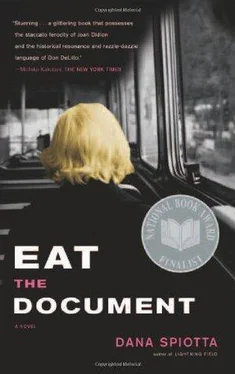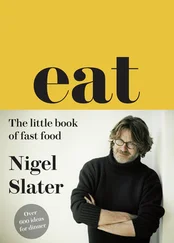Dana Spiotta - Eat the Document
Здесь есть возможность читать онлайн «Dana Spiotta - Eat the Document» весь текст электронной книги совершенно бесплатно (целиком полную версию без сокращений). В некоторых случаях можно слушать аудио, скачать через торрент в формате fb2 и присутствует краткое содержание. Год выпуска: 2006, Издательство: Scribner, Жанр: Современная проза, на английском языке. Описание произведения, (предисловие) а так же отзывы посетителей доступны на портале библиотеки ЛибКат.
- Название:Eat the Document
- Автор:
- Издательство:Scribner
- Жанр:
- Год:2006
- ISBN:нет данных
- Рейтинг книги:3 / 5. Голосов: 1
-
Избранное:Добавить в избранное
- Отзывы:
-
Ваша оценка:
- 60
- 1
- 2
- 3
- 4
- 5
Eat the Document: краткое содержание, описание и аннотация
Предлагаем к чтению аннотацию, описание, краткое содержание или предисловие (зависит от того, что написал сам автор книги «Eat the Document»). Если вы не нашли необходимую информацию о книге — напишите в комментариях, мы постараемся отыскать её.
shifts between the underground movement of the 1970s and the echoes and consequences of that movement in the 1990s. A National Book Award finalist,
is a riveting portrait of two eras and one of the most provocative and compelling novels of recent years.
Eat the Document — читать онлайн бесплатно полную книгу (весь текст) целиком
Ниже представлен текст книги, разбитый по страницам. Система сохранения места последней прочитанной страницы, позволяет с удобством читать онлайн бесплатно книгу «Eat the Document», без необходимости каждый раз заново искать на чём Вы остановились. Поставьте закладку, и сможете в любой момент перейти на страницу, на которой закончили чтение.
Интервал:
Закладка:
“I prefer the loggers to these ego-tripping U of O radicals. At least the loggers don’t pretend to care about women’s rights,” said Beth, a dark-haired, very thin woman.
“Yeah, these guys want free love and then they want you to do their laundry.” And so it went, and Caroline just listened quietly.
“Enough about men. We are not going to spend the evening discussing men, even criticizing men.” This from Mel. Caroline listened to Mel and then saw Mel carefully check her out. Caroline thought of how she looked to the others. She probably was the only one with shaved legs. And definitely the only one wearing lipstick, albeit a practically undetectable neutral peach tone. Caroline thought it went with the dyed blond hair. It wasn’t her, but that was the point. But no one seemed to notice. She felt okay here, inspired even. These women reinvented themselves: political lesbians, or merely libbers. Ah, liberation! Caroline always had to take a minute and work out what words the abbreviations stood for, or what the initials and acronyms referred to. She always had trouble with that, the way all the groups and movements shortened things and slanged them, or designed names just so they made acronyms, which were what they actually wanted to be called — like WITCH, the Women’s International Terrorist Conspiracy from Hell. Designed for insiders — exclusive and status conscious, when you thought about it. Besides, the prepositions always tripped her up when she tried to remember what the letters of the acronyms stood for. Her brain didn’t naturally work that way. Bobby loved it, he created an acronym or initialism or nickname whenever possible. Bobby pointed out how that all comes from the military, how every subculture ultimately imitates the military, which is the mother lode of all exclusive subgroups. But Caroline thought it mustn’t be just exclusivity. The military has the most slang and acronyms because it has most need of euphemism. What does that tell you?
She believed failure of language belied deeper failings in the counterculture. The names just became more and more divorced from their meanings. What was the point of using a name in that way? Shouldn’t a name remind you of who you are, or are trying to be? Did they really want a name to be part of a secret, exclusive language — a club that intended to exclude, that deliberately obscured things for outsiders? Was the need to be exclusive sort of reactionary, oppressive and even patriarchal? Caroline knew she was onto something, she was learning how things get away from people. How gradually they, what? Become the very thing they long to escape.
What were these women up to? Trying to recast their lives without men. Trying to forget the entire culture, trying to question all the things they had presumed their whole lives. And why couldn’t Caroline have done that? Why couldn’t she have been a radical separatist, at the margins? How different it would have been if she had tried to save just herself instead of the whole world? But that was what she was now — a movement of one. The most radical separatist of all. You are moved to save the world, and then you are reduced to organizing everything just to save yourself.
Mel dominated the group: when she spoke, and although she spoke softly, the other conversations yielded and attention was paid. Mel’s aviator-shaped wire-rimmed glasses caught some of her hair in front of her ears, under the frames, Steinem-style. Mel spoke of entrepreneurial self-sufficiency, not domesticity. She wanted to expand the co-op. She wanted to force banks to give low-interest loans to women-owned businesses. Mel didn’t have anything to say about abortion, the pill or the hierarchies of orgasms. After it was over, Berry walked Caroline home.
“Freaky group, huh?”
Caroline smiled.
“Melinda doesn’t respect me because I still fuck men,” she said. Caroline nodded. So Mel was Melinda. She already hated the name Caroline. She made a promise that the next time she had to come up with a new name, she would choose one that had a man’s name for a nickname.
“But she’s trying to free herself of all the disempowering stuff that gets fed us from day one. I agree, look at the women you see in the movies and on TV. Ask yourself what we are being sold by the establishment.” Caroline nodded but kind of lost interest. She was weary of those words. Empowerment, establishment, military-industrial complex. Male chauvinism, imperialism. Syndicalism. Leftist. Marxist, Maoist. The oppression of all that freighted rhetoric, the ists and isms, made her feel spiritual fatigue. She knew this connected to her current predicament in profound ways, if she cared to examine it, which she didn’t, not yet.
There was an undeniable innocence to her first year underground. Before Caroline’s big screwup (which, really, she should have seen coming), she existed in nunlike simplicity. Her constant fear ordered her life and gave her purpose. Everything pertained to her maintaining her liberty, nothing else applied. Every decision, every waking and sleeping moment was enclosed and ordered by her fugitive status. Sometimes, as she lay in her bed, she considered the possibility of turning herself in. But she knew what happened to other fugitives when they turned themselves in — unless they informed on their colleagues, they got long punitive sentences.
Time just went by. She began to think of time as something she had logged in since the event, as if that might earn her something. Later she would look at time like scenery outside the window of a train, just a way of noticing what had passed her by, or what she had passed by. Another birthday for her sister, or her mother. As time accumulated, she thought less and less of turning herself in — being a fugitive was becoming her identity, the journey turned into the thing itself, the reason for being. In and of itself, her underground life felt like an accomplishment. She was recast, and it grew harder and harder not to continue. Prisoner or fugitive? But couldn’t she perhaps live forever at the margins, and have a good new life? By the summer of her first year underground, she even enjoyed occasional periods of comfort.
She continued to cook for the CR meetings. Vegetarian chili. Rhubarb pies with wheat crusts. Nut loafs and spinach lasagnas. Everyone loved her food. She even became friendly with Mel. Mel believed traditional women’s work needed to be reclaimed for their own purposes. She tried to help Caroline.
“You should quit the cafe and work at the bookstore. We could offer some light food in the back, where the reading tables are. We could start with baked goods and coffee.” Mel pushed her glasses up. She held herself stiffly. She didn’t wear a bra, but her sweatshirts concealed her breasts anyway. And when Berry flounced around falling out of her shirt, it was obvious that Mel found it all a bit too voluptuous. This annoyed Caroline; she sensed it was something complex and unfair in Mel.
“I think Berry is lovely,” Caroline said to Mel one day as they sat on the couch and ate chili. There was a lounge area upstairs from the bookstore, and they often had the CR meetings there. Caroline didn’t know why she said it, except Berry was finger-combing her hair absently and she did look lovely. Berry always seemed to be touching herself, and it made her appear suggestive and sybaritic. But it wasn’t for show, it wasn’t a display. It was just her, and the way she felt free to enjoy the thousand tiny soft delights of her own body.
“She’s a slob. She has this flower child gluttony about her. It’s a waste of energy,” Mel said without hesitating. “You get the sense that she wants the easy way out of everything.”
“That’s a pretty shallow extrapolation. Do tough people have to look tough?”
Читать дальшеИнтервал:
Закладка:
Похожие книги на «Eat the Document»
Представляем Вашему вниманию похожие книги на «Eat the Document» списком для выбора. Мы отобрали схожую по названию и смыслу литературу в надежде предоставить читателям больше вариантов отыскать новые, интересные, ещё непрочитанные произведения.
Обсуждение, отзывы о книге «Eat the Document» и просто собственные мнения читателей. Оставьте ваши комментарии, напишите, что Вы думаете о произведении, его смысле или главных героях. Укажите что конкретно понравилось, а что нет, и почему Вы так считаете.












